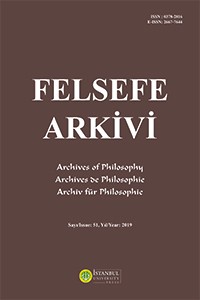Abstract
Immanuel Kant proclaims that the ‘transcendental logic’, the form of logic that he uniquely offers, aims at laying out the necessary laws and principles of nature on the basis of the synthesis of the a priori concepts of understanding and the a priori elements of intuition. In this regard, logic, in Kantian sense, is directed towards the knowledge of the nature which he identifies as the phenomenal world (appearances). The noumenal world (transcendental concepts of God, immortality and freedom), on the other hand, is acclaimed to extend beyond the boundaries of logic. Likewise, Ludwig Wittgenstein points to the boundaries of logic. In his view, logic is limited to the states of affairs in the world (the whole reality). In other words, Wittgenstein argues that one can logically think and talk about merely the facts in the world. The transcendental concepts like logical form, philosophy, aesthetic and ethics, on the other hand, are offered to be beyond the boundaries of logicality. Hence, my aim in this study will be to embark on the boundaries and the legitimate use of logic in Kant and Wittgenstein in parallel to each other.
References
- Bohnet, Clayton,Logic and Limits of Philosophy in Kant and Hegel, UK: Palgrave Macmillan, 2015.
- González-Castán, Oscar L.,“Overcoming Positivism: Husserl and Wittgenstein”, Phänomenologische Forschungen, 13-58, 2014, http://www.jstor.org/stable/24360721.
- Grayling, Anthony Clifford,Wittgenstein: A Very Short Introduction, New York: Oxford University Press, 1996.
- Guyer, Paul, Cambridge Companion to Kant, New York: Cambridge University Press, 2006.
- Kant, Immanuel,Critique of Pure Reason, Çev. ve Ed. Paul Guyer ve Allen W. Wood, USA:Cambridge University Press, 1998.
- Kant, Immanuel,Lectures On Logic, Çev. ve Ed. J. Michael Young, USA: Cambridge University Press, 1992.
- Kant, Immanuel, Critique of Practical Reason, Çev. Werner S. Pluhar, USA: Hackett Publishing Company, 2002.
- Kant, Immanuel,Gelecekte Bilim Olarak Ortaya Çıkabilecek Her Metafiziğe Prolegomena, Çev. Ionna KuçuradiYusuf Örnek, Ankara: Türkiye Felsefe Kurumu, 2000.
- Kant, Immanuel,Arı Usun Eleştirisi, Çev. Aziz Yardımlı, İstanbul: İdea, 2015.
- Kant, Schopenhauer, Heidegger, Düşüncenin Çağrısı, Çev. Ahmet Aydoğan, İstanbul: Say Yayınları, 2009.
- Schulte, Joachim,Wittgenstein: An Introduction, New York: State University of New York Press, 1992.
- Seth, Andrew, The Development from Kant to Hegel, London: Cambridge Scholars Press Ltd, 2002.
- Stroll, Avrum,Moore and Wittgenstein on Certainty, USA: Oxford University Press, 1994.
- Wenley, Robert Mark, Kant and His Philosophical Revolution, Adalaide, London and Washington: Cambridge Scholars Press Ltd, 2002.
- Wittgenstein, Ludwig, “A Lecture on Ethics”, The Philosophical Review, Vol. 74, No. 1. (Jan., 1965), pp. 3-12.
- Wittgenstein, Ludwig, Tractacus Logico-Philosophicus, Çev. Oruç Arouba, İstanbul: Metis Yayınları, 2011.
- Wittgenstein, Ludwig, Notebooks 1914-1916, Ed. G. H. Wright, USA: University of Chicago Press, 1984.
Abstract
Immanuel Kant kendi özgün mantık anlayışı olan ‘transandantal mantığın’ alanını görünür dünya olarak kabul ettiği doğa yasalarını ortaya çıkarmakla sınırlar. Ona göre, mantık yasaları, anlama yetisinin a priori kavramları ile uzay ve zaman formlarındaki a priori görüsel temsillerin sentezine dayanır ve bu zeminde doğanın saf ve zorunluluklu bilgisini ortaya çıkarır. Ancak Kant’a göre, bütün gerçeklik, görünüşlerin alanı olan doğa ile sınırlı değildir. Nitekim görünür dünyayı aşan ve şeylerin kendisini ifade eden bir alan vardır ki bu alanın bilgisi mantık ile ulaşılabilir değildir. Kant’ın kendinde-şey (noumenal dünya) olarak kavramsallaştırdığı ve Tanrı, ölümsüzlük ve özgürlük gibi transandantal kavramlar ile tasavvur edilebilen bu alanın bilgisi mantığın üzerindeki bir yeti olan saf aklın temsil faaliyetine dayandırılır. Benzer şekilde, Ludwig Wittgenstein mantığın sınırlarına vurgu yapar. Wittgenstein’a göre, mantığın alanı mantıksal uzay içinde ortaya çıkan olgu bağlamları ile sınırlıdır. Buna karşın, Wittgenstein’ın mantığa aşkın kavramlar olarak kabul ettiği mantıksal form, felsefe, estetik ve etik gibi kavramlar mantıksal önermeler ile ifade edilebilir değildir ve Wittgenstein bu kavramlar konusunda sessiz kalmayı önermiştir. Bu çerçevede, bu makalede, Kant’tan Wittgenstein’a mantığın sınırları ele alınacak ve mantıksal bilginin meşruiyet alanı tartışılacaktır.
References
- Bohnet, Clayton,Logic and Limits of Philosophy in Kant and Hegel, UK: Palgrave Macmillan, 2015.
- González-Castán, Oscar L.,“Overcoming Positivism: Husserl and Wittgenstein”, Phänomenologische Forschungen, 13-58, 2014, http://www.jstor.org/stable/24360721.
- Grayling, Anthony Clifford,Wittgenstein: A Very Short Introduction, New York: Oxford University Press, 1996.
- Guyer, Paul, Cambridge Companion to Kant, New York: Cambridge University Press, 2006.
- Kant, Immanuel,Critique of Pure Reason, Çev. ve Ed. Paul Guyer ve Allen W. Wood, USA:Cambridge University Press, 1998.
- Kant, Immanuel,Lectures On Logic, Çev. ve Ed. J. Michael Young, USA: Cambridge University Press, 1992.
- Kant, Immanuel, Critique of Practical Reason, Çev. Werner S. Pluhar, USA: Hackett Publishing Company, 2002.
- Kant, Immanuel,Gelecekte Bilim Olarak Ortaya Çıkabilecek Her Metafiziğe Prolegomena, Çev. Ionna KuçuradiYusuf Örnek, Ankara: Türkiye Felsefe Kurumu, 2000.
- Kant, Immanuel,Arı Usun Eleştirisi, Çev. Aziz Yardımlı, İstanbul: İdea, 2015.
- Kant, Schopenhauer, Heidegger, Düşüncenin Çağrısı, Çev. Ahmet Aydoğan, İstanbul: Say Yayınları, 2009.
- Schulte, Joachim,Wittgenstein: An Introduction, New York: State University of New York Press, 1992.
- Seth, Andrew, The Development from Kant to Hegel, London: Cambridge Scholars Press Ltd, 2002.
- Stroll, Avrum,Moore and Wittgenstein on Certainty, USA: Oxford University Press, 1994.
- Wenley, Robert Mark, Kant and His Philosophical Revolution, Adalaide, London and Washington: Cambridge Scholars Press Ltd, 2002.
- Wittgenstein, Ludwig, “A Lecture on Ethics”, The Philosophical Review, Vol. 74, No. 1. (Jan., 1965), pp. 3-12.
- Wittgenstein, Ludwig, Tractacus Logico-Philosophicus, Çev. Oruç Arouba, İstanbul: Metis Yayınları, 2011.
- Wittgenstein, Ludwig, Notebooks 1914-1916, Ed. G. H. Wright, USA: University of Chicago Press, 1984.
Details
| Primary Language | Turkish |
|---|---|
| Subjects | Philosophy |
| Journal Section | Makaleler |
| Authors | |
| Publication Date | December 31, 2019 |
| Published in Issue | Year 2019 Issue: 51 |


